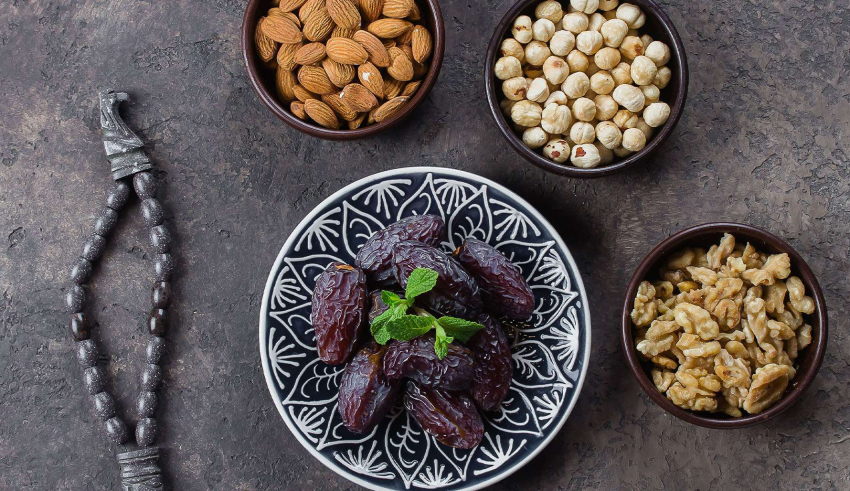
Ramadan 2021 is only a few days away, and while the holy month is filled with goodness, it is important to maintain our energy levels and avoid the temptations of unhealthy foods that come with the month. During Ramadan, it is normal to notice a difference in your body’s energy level, and this depends on what you eat or avoid at Iftar and Suhoor meals. For example, your body may need to consume sugars after a long fast, but this is bad for the health of your body and skin. From here, in the following lines, we will provide you with some dietary tips that you need to keep in mind during the month of Ramadan to maintain good health, the freshness of your skin, and increase your energy.
Foods to avoid during Ramadan
1- Fatty and fried foods
Nutritionists advise in general and during the month of Ramadan in particular, to avoid eating fatty and fried foods, such as sweet dishes, fried dumplings, and fried kunafa… in addition to various pastry dishes such as samosas because they are saturated with fats that are quickly accumulated by the body. Also, eating fatty foods after long hours of fasting can cause stomach problems such as heartburn and indigestion.
2- Foods that are high in sugar
Nutritionists recommend avoiding foods that contain a high percentage of sugar, such as sweet oriental Ramadan dishes and milk chocolate because they have low nutritional value. Besides, they are rich in high calories that turn into accumulated fat and thus cause weight gain. They can also lead to health problems if consumed daily during the whole month of Ramadan.
3- Soft drinks and processed juices
Consumption of soft drinks and processed juices is one of the bad habits at the Iftar and Suhoor table. These drinks usually contain a high sugar content which leads to weight gain. This harmful habit can also cause skin problems such as pimples, in addition to bloating and gas that leads to indigestion. Experts advise drinking water or coconut water, which are ideal alternatives to these harmful drinks.
4- Foods high in simple or refined carbohydrates
These foods include sugars, pastries, cakes, doughnuts, croissants, and white flour… all of which increase satiety for no more than 4 hours and then leave you hungry during the fast.
5- Salty foods
An imbalance of sodium levels in your body makes you very thirsty during fasting. So try to avoid salted nuts, pickles, french fries, and all kinds of foods that contain soy sauce.
6- Caffeinated drinks
Nutritionists warn against drinking coffee during Suhoor meal, as it, in turn, leads to insomnia. Also, coffee is a diuretic, so you will be dehydrated during the fast, which affects the youthfulness of the skin.
Foods to eat during Ramadan
Nutritionists emphasize that iftar and suhoor meals should be balanced and contain a variety of nutrients, namely vegetables, fruits, meats, dairy products, grains, and legumes. Read on for more details.
1- Eat hydrating foods and drink plenty of water during Ramadan.
Drink at least 10 glasses of water between Iftar and Suhoor, especially in hot weather. You can also boost your water consumption by eating hydrating foods, such as adding watermelon to your Suhoor meal or eating it after Iftar. Similarly, the traditional Arabic fattoush salad contains lots of cucumbers and lettuce, which are hydrating vegetables. Not only do they help your body feel fresh, but they are also a great choice for keeping your skin healthy and avoiding constipation during Ramadan.
2- Eat the right foods at Suhoor to last during the fasting hours.
Suhoor should be a healthy meal that gives you enough energy to last until Iftar. It is therefore important to choose the right foods to sustain you during the fast. Eating complex carbohydrates found in fruits and vegetables, beans, chickpeas, and lentils, will provide you with a sustainable source of energy throughout the day. Accompany your meal with low-fat dairy products, such as labneh or laban, and try to incorporate healthy unsaturated fats, such as avocado, unsalted nuts, salmon, olives, and olive oil.
Be careful not to eat everything you need at once during suhoor. If you do, your body won’t be able to use the energy intake all at once, which can lead to weight gain.
3- Replenish your energy by eating a healthy and balanced Iftar.
- Eat three dates to break the fast as this is a traditional and healthy way to start Iftar. Dates are an excellent source of fiber and they give you instant energy that makes you feel rejuvenated after the long hours of fasting. Nuts and almonds are also good dietary supplements.
- Include plenty of vegetables that will provide you with essential vitamins and nutrients.
- Choose whole-grain bread and pasta, couscous or bulgur wheat, which are rich in carbohydrates and fiber that are good for your digestive system.
- Enjoy lean meat, skinless chicken, and fish, grilled or baked, for a good portion of healthy protein.
- Grab some fresh fruit and ice cream, if you are a dessert lover, which are a lighter alternative to chocolate desserts or pastries.
Staying healthy during this Holy Month
During Ramadan, avoid daily activities that can dehydrate your body, especially on hot days. If you work in hot weather or are a professional athlete who fasts, use supplements for a balanced, healthy diet that supports your daily activities.
If you exercise regularly, you should continue to meet your daily energy, protein, and water needs during non-fasting periods. Also, reduce your exercise time by 30% during Ramadan.
And last but not least… Celebrate! This is the most joyful month of the year. Ramadan is indeed a sacred time and fasting is an important part of this holy month, but as you can see, there are many options for fasting while staying healthy and nourished. Thus, you can still enjoy the fast and capture the spirit of Ramadan by drinking enough water and watching what you eat during suhoor and after iftar.
Last Updated on December 15, 2023









